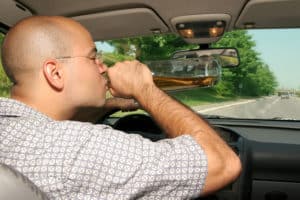 You’re driving home one night after having a few drinks with your coworkers, and you’re a little tired. Maybe you’re blinking a little slower than usual, or you just aren’t focusing as well and you drift into the other lane. You quickly jerk the car back into the correct position, but there was a witness and now you see the flashing blue lights in your rear view mirror. You’re getting pulled over. You think, no big deal, I only had two drinks tonight. I’m under the legal limit. You take the breathalyzer, your blood alcohol concentration (BAC) is .04%, and you think you’re safe, but you aren’t.
You’re driving home one night after having a few drinks with your coworkers, and you’re a little tired. Maybe you’re blinking a little slower than usual, or you just aren’t focusing as well and you drift into the other lane. You quickly jerk the car back into the correct position, but there was a witness and now you see the flashing blue lights in your rear view mirror. You’re getting pulled over. You think, no big deal, I only had two drinks tonight. I’m under the legal limit. You take the breathalyzer, your blood alcohol concentration (BAC) is .04%, and you think you’re safe, but you aren’t.
Most people don’t realize that having a BAC of .08% or above is not the only way you can be charged with a California DUI. If your BAC is anything above zero and you’re exhibiting signs of driving under the influence, you can be charged. You’ve made it apparent that you are a danger on the roads. You also can be held to higher penalties in certain circumstances, such as a BAC of over .20%, and you will likely have an ignition interlock requirement, no matter your BAC.
If you are under 21, you should be especially careful. Underage drivers only have to have a BAC of .01% to be charged with a DUI and if you are under the age of 18, it’s zero tolerance. Zero tolerance means if your BAC is anything except zero, you will receive a California DUI charge. If you are underage and you choose to drink, be certain you have a way home that includes a sober driver.
CDL drivers should also exercise extreme caution as anything .04% or above will result in a California DUI charge. This will have the domino effect of losing your CDL license therefor losing your job. You don’t want to mess with your livelihood, have a sober driver and don’t operate a vehicle while under the influence.
Now that you’ve been charged with a California DUI, what happens next? The first thing you should probably do is contact a reputable attorney. Having professional help to navigate the often tricky legal system is always a good plan and California DUI penalties can be steep. Having someone on your side to help reduce jail and ignition interlock device time could help you get your life back on track faster.
